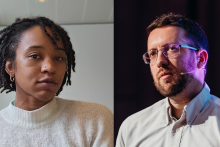Alan Houot has dedicated his Master research at the University of Twente to the study of psychedelics. Simply said, the central question guiding his research was ‘Why are people so afraid of psychedelics?’ And how can we decrease society’s and individuals’ fear of these drugs?
‘Decreasing this fear could certainly be beneficial, because psychedelics are known to enhance cognitive functions, boost creativity and are even used therapeutically,’ says Houot, when discussing his thesis Toward a Philosophy of Psychedelic Technology: An Exploration of Fear, Otherness, and Control. ‘To my knowledge, nobody has combined the study of psychedelics and philosophy of technology until now.’
‘Trying to rationalize the nonrational’
What has led him to the topic? Originally from the U.S., Houot obtained two Bachelor degrees – one in International Business and one in Social Sciences – and worked as a bartender in Oslo for six years before deciding to study in Twente.
‘I had a very interesting experience using psychedelics, an experience that I could not explain’
‘I actually came here to get a degree in online surveillance,’ he says. ‘Online surveillance was my first academic love and psychedelics was my hobby. Then I was at crossroads. I had a very interesting experience using psychedelics, an experience that I could not explain. I was filled with so many questions and my hobby became my main academic love. Psychedelic drugs are the ultimate mystery. I’m trying to rationalize the nonrational.’
Houot has covered various psychedelics in his work. From plant based natural drugs, such as magic mushrooms, ayahuasca and iboga, to synthetics including LSD, mescaline and MDMA. ‘I’ve focused on drugs mainly used in religious or spiritual traditions. Even common drugs like caffeine or alcohol lead to altered states of consciousness, but they are mostly stimulants. I focus on so called hallucinogenic drugs that expand your mind, allow you to learn something new about yourself and see things in a different light. Yet, society is so afraid of them that we have archaic laws banning them.’
‘Psychedelics make people think outside the box’
The researcher argues that this fear stems from governmental and religious institutions ‘feeling threatened by these substances’. ‘They worry that psychedelic users will harm one’s self and others because psychedelics are still falsely believed to bring on symptoms of mental illnesses. Moreover, it’s difficult to communicate a psychedelic experience and so you might even sound like a crazy person if you try.’
‘When it comes to religion, if you can access divine realms through drugs, you can bypass the entire hierarchy of the church. That is not good for business, so to speak,’ says Houot. ‘Simply, psychedelics make people think outside the box, which is threating for institutions that aim to maintain social order.’
‘On a personal level, there will always be fear of psychedelics’
On an individual level, the fear of psychedelics comes from ‘the unknown’. ‘Traumatic experiences or things that we didn’t know we remembered can emerge. We are essentially afraid of ourselves,’ says Houot. ‘However, the ultimate psychedelic fear, I argue, is of a conscious and intelligent unknown presence. People report seeing entities, something greater and unhuman. And that is fearful.’ Is it even possible to overcome these fears? ‘On a personal level, there will always be fear of psychedelics, because each experience is different.’

Control, not surrender
‘I think that we just don’t know how to use these substances properly,’ says Houot. ‘Instead of “surrendering” to the psychedelic experience, a motif adopted by modern users from mysticism and Eastern religious practices, we could learn to control it.’ To do that, the researcher believes we should look to shamans. ‘Drug-taking shamans are said to control and master their experiences through the joint use of symbolism, techniques, and technologies. If we know how to control it, we can be less fearful of it.’
‘In my work, I’m trying to offer a new paradigm: control instead of surrender. We need to reexamine the way we think of psychedelics. They are not addictive and they can expand our minds. Additionally, they appear to be useful: MDMA aids in couples therapy, ayahuasca and iboga help opioid addicts overcome addictions and Silicon Valley technologists “microdose” LSD for cognitive enhancement. Yes, there are risks but there are risks everywhere. We know the risks when we put our bodies on the line; why are things different when it comes to the mind? We need to study these risks, so we can be prepared and reduce the fear.’







